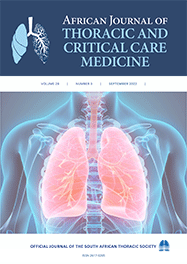Original research

Knowledge of the health consequences of tobacco smoking among Nigerian smokers: A secondary analysis of the Global Tobacco Survey
Abstract
Background. Tobacco smoking is a leading cause of preventable death in the world and a risk factor for several non-communicable diseases. Based on current trends, it is estimated that tobacco smoking will account for 8.4 million premature deaths each year by 2030. Knowledge of the consequences of smoking is necessary to initiate smoking cessation.
Objectives. This study aimed to identify the knowledge and perceived risks of the health consequences of smoking with regard to cancer among smokers in Nigeria.
Methods. This was a secondary data analysis of the Global Adult Tobacco Survey (GATS). The 2012 Nigerian GATS was a national representative household survey of 9 765 non-institutionalised men and women aged 15 years and older. Associations between sociodemographic variables, beliefs and attitude about smoking and its consequences were explored using the χ2 test. The level of statistical significance was 5%.
Results. The records of all current smokers (4.4%; N=429) were extracted. The mean (standard deviation) age of smokers was 43.7 (14.6) years. Only 3.5% (n=15) were female, and 57.2% (n=245) were rural dwellers. Of the 9 765 that participated in the study, a total of 335 (3.4%) were daily tobacco smokers while 94 (1.0%) smoke less often than daily. Knowledge that smoking can cause various cancers was reported as follows: lung cancer 58.3% (n=250); bladder cancer 31.0% (n=133); mouth cancer 34.0% (n=146); and stomach cancer 31.5% (n=135). Overall, 67.8% (n=291) believed smoking tobacco caused serious illness. In the North Central region, 40.0% (n=32) knew that smoking could cause lung cancer compared with 75.0% (n=51) in the South East (p<0.001). Among rural dwellers, only 48.4% (n=119) knew that smoking could cause lung cancer compared with 71.6% (n=131) of urban dwellers (p<0.001).
Conclusion. The level of awareness of the adverse effects of tobacco smoking in Nigeria was low and varied by region and socioeconomic development. This presents a potential point of intervention through targeted health educational campaigns to change behaviour among smokers.
Authors' affiliations
B O Adeniyi, Department of Internal Medicine, Federal Medical Centre, Owo, Ondo State, Nigeria
O S Ilesanmi, Department of Community Medicine, Federal Medical Centre, Owo, Ondo State, Nigeria
O M Babasola, Department of Public Health, Africare Nigeria, Lagos, Nigeria
B I Awokola, Medical Research Council (UK) Unit, Fajara Camp, The Gambia
A O Kareem, Department of Community Medicine, Federal Medical Centre, Owo, Ondo State, Nigeria
D Obaseki, Department of Internal Medicine, Obafemi Awolowo University, Ile-Ife, Osun State, Nigeria
G E Erhabor, Department of Internal Medicine, Obafemi Awolowo University, Ile-Ife, Osun State, Nigeria
Full Text:
Cite this article
Article History
Date published: 2017-12-05
Article Views
Full text views: 437
Refbacks
- There are currently no refbacks.
African Journal of Thoracic and Critical Care Medicine| Online ISSN: 2617-0205
This journal is protected by a Creative Commons Attribution - NonCommercial Works License (CC BY-NC 4.0) | Read our privacy policy.
Our Journals: South African Medical Journal | African Journal of Health Professions Education | South African Journal of Bioethics and Law | South African Journal of Child Health | Southern African Journal of Critical Care | African Journal of Thoracic and Critical Care Medicine| South African Journal of Obstetrics and Gynaecology |



.jpg)